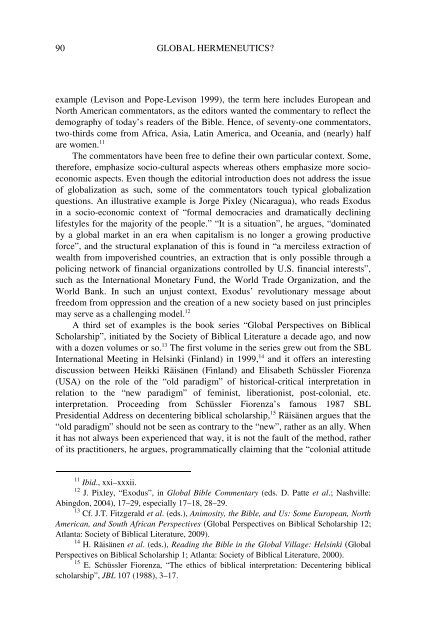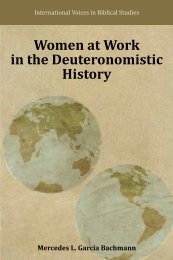Global Hermeneutics? - International Voices in Biblical Studies ...
Global Hermeneutics? - International Voices in Biblical Studies ...
Global Hermeneutics? - International Voices in Biblical Studies ...
You also want an ePaper? Increase the reach of your titles
YUMPU automatically turns print PDFs into web optimized ePapers that Google loves.
90 GLOBAL HERMENEUTICS?<br />
example (Levison and Pope-Levison 1999), the term here <strong>in</strong>cludes European and<br />
North American commentators, as the editors wanted the commentary to reflect the<br />
demography of today’s readers of the Bible. Hence, of seventy-one commentators,<br />
two-thirds come from Africa, Asia, Lat<strong>in</strong> America, and Oceania, and (nearly) half<br />
are women. 11<br />
The commentators have been free to def<strong>in</strong>e their own particular context. Some,<br />
therefore, emphasize socio-cultural aspects whereas others emphasize more socioeconomic<br />
aspects. Even though the editorial <strong>in</strong>troduction does not address the issue<br />
of globalization as such, some of the commentators touch typical globalization<br />
questions. An illustrative example is Jorge Pixley (Nicaragua), who reads Exodus<br />
<strong>in</strong> a socio-economic context of “formal democracies and dramatically decl<strong>in</strong><strong>in</strong>g<br />
lifestyles for the majority of the people.” “It is a situation”, he argues, “dom<strong>in</strong>ated<br />
by a global market <strong>in</strong> an era when capitalism is no longer a grow<strong>in</strong>g productive<br />
force”, and the structural explanation of this is found <strong>in</strong> “a merciless extraction of<br />
wealth from impoverished countries, an extraction that is only possible through a<br />
polic<strong>in</strong>g network of f<strong>in</strong>ancial organizations controlled by U.S. f<strong>in</strong>ancial <strong>in</strong>terests”,<br />
such as the <strong>International</strong> Monetary Fund, the World Trade Organization, and the<br />
World Bank. In such an unjust context, Exodus’ revolutionary message about<br />
freedom from oppression and the creation of a new society based on just pr<strong>in</strong>ciples<br />
may serve as a challeng<strong>in</strong>g model. 12<br />
A third set of examples is the book series “<strong>Global</strong> Perspectives on <strong>Biblical</strong><br />
Scholarship”, <strong>in</strong>itiated by the Society of <strong>Biblical</strong> Literature a decade ago, and now<br />
with a dozen volumes or so. 13 The first volume <strong>in</strong> the series grew out from the SBL<br />
<strong>International</strong> Meet<strong>in</strong>g <strong>in</strong> Hels<strong>in</strong>ki (F<strong>in</strong>land) <strong>in</strong> 1999, 14 and it offers an <strong>in</strong>terest<strong>in</strong>g<br />
discussion between Heikki Räisänen (F<strong>in</strong>land) and Elisabeth Schüssler Fiorenza<br />
(USA) on the role of the “old paradigm” of historical-critical <strong>in</strong>terpretation <strong>in</strong><br />
relation to the “new paradigm” of fem<strong>in</strong>ist, liberationist, post-colonial, etc.<br />
<strong>in</strong>terpretation. Proceed<strong>in</strong>g from Schüssler Fiorenza’s famous 1987 SBL<br />
Presidential Address on decenter<strong>in</strong>g biblical scholarship, 15 Räisänen argues that the<br />
“old paradigm” should not be seen as contrary to the “new”, rather as an ally. When<br />
it has not always been experienced that way, it is not the fault of the method, rather<br />
of its practitioners, he argues, programmatically claim<strong>in</strong>g that the “colonial attitude<br />
11<br />
Ibid., xxi–xxxii.<br />
12<br />
J. Pixley, “Exodus”, <strong>in</strong> <strong>Global</strong> Bible Commentary (eds. D. Patte et al.; Nashville:<br />
Ab<strong>in</strong>gdon, 2004), 17–29, especially 17–18, 28–29.<br />
13<br />
Cf. J.T. Fitzgerald et al. (eds.), Animosity, the Bible, and Us: Some European, North<br />
American, and South African Perspectives (<strong>Global</strong> Perspectives on <strong>Biblical</strong> Scholarship 12;<br />
Atlanta: Society of <strong>Biblical</strong> Literature, 2009).<br />
14<br />
H. Räisänen et al. (eds.), Read<strong>in</strong>g the Bible <strong>in</strong> the <strong>Global</strong> Village: Hels<strong>in</strong>ki (<strong>Global</strong><br />
Perspectives on <strong>Biblical</strong> Scholarship 1; Atlanta: Society of <strong>Biblical</strong> Literature, 2000).<br />
15<br />
E. Schüssler Fiorenza, “The ethics of biblical <strong>in</strong>terpretation: Decenter<strong>in</strong>g biblical<br />
scholarship”, JBL 107 (1988), 3–17.




